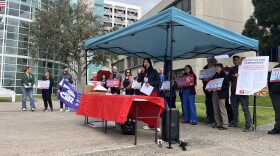The city of San Diego leased a former motel in Barrio Logan on Wednesday to create a new shelter for families with children experiencing homelessness.
The bridge housing program is intended to provide families a stable place to stay and on-site supportive services, including meals, mail services, security, housing support and case management.
The 42-room site at the former Travelodge Hotel will serve up to 164 individuals and provide an administrative office, laundry room, break room and parking lot. The lease is for an initial seven-month term with two one-year extension options.
"As long as there are people living unsheltered in the city of San Diego, we will not stop working to get them off the streets and on a path to housing," Mayor Todd Gloria said. "This new shelter will give 42 struggling families a private space of their own to live while we work to connect them to a permanent home."
According to a city statement, non-congregate shelters allow for individualized service and increased engagement on participants' part to help resolve their homelessness.
"The city is working with partners across the region to find solutions that align with national best practices," said Hafsa Kaka, the city's Homelessness Strategies and Solutions Department director. "We know that families experiencing homelessness engage more and feel safer in non-congregate shelters."
The department will use about $350,000 awarded to the city as part of the county's $10 million Capital Emergency Housing Solutions Grant Program. Officials are "currently working to begin capital improvements and identify a service provider to operate the shelter to serve residents in need as quickly as possible," a city statement read.
Several other shelters have been opened in recent months, including Seniors Landing in Little Italy, a Safe Haven shelter just outside of Midway for people with acute behavioral health challenges and a shelter for women operated by the National Alliance on Mental Illness at the Old Central Library downtown.
Despite this, according to monthly data collected by the Regional Task Force on Homelessness, the number of people falling into homelessness for the first time continues to outpace those being housed — 1,211 to 663 in January's report.







